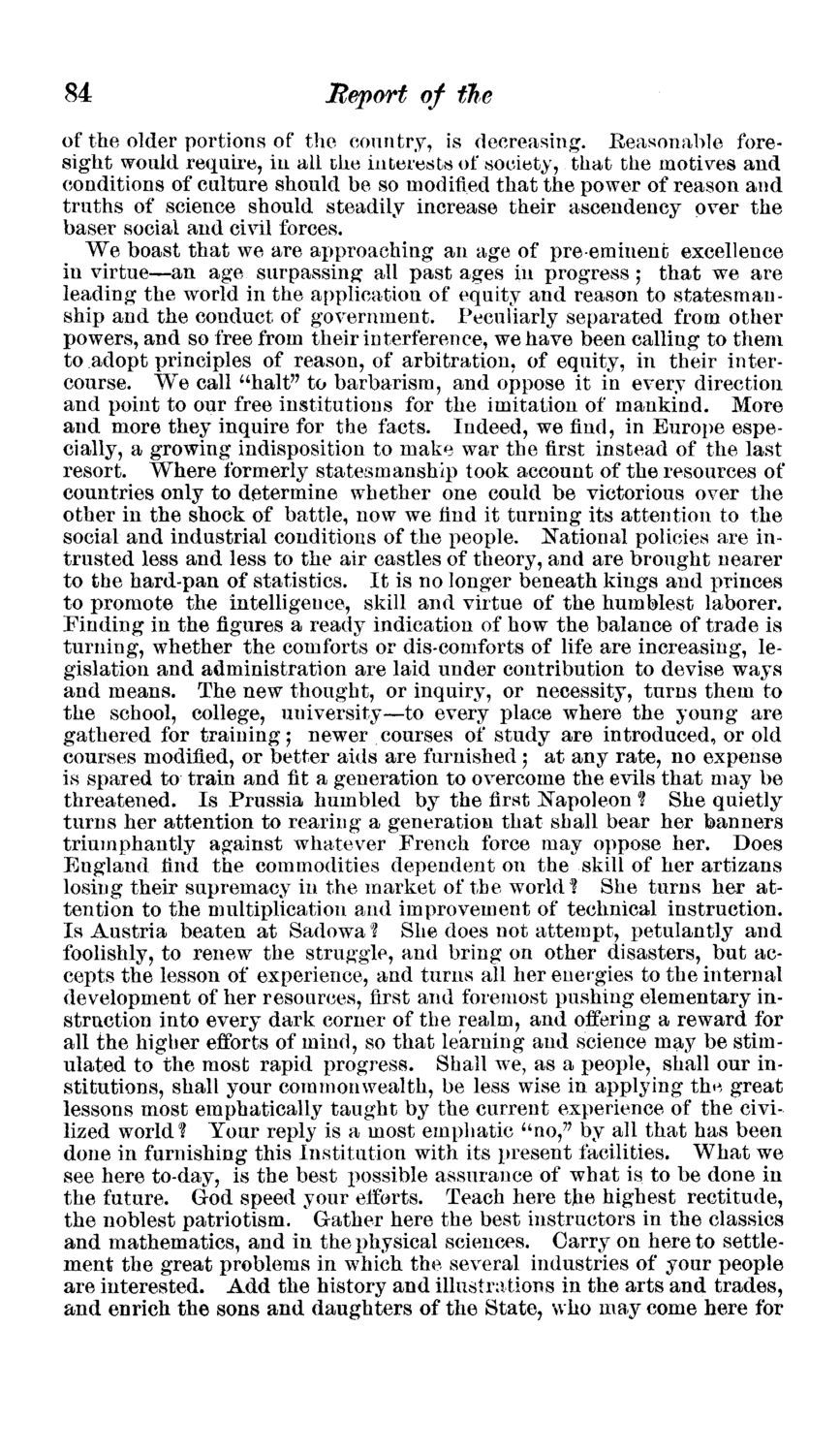| |
| |
Caption: Board of Trustees Minutes - 1874
This is a reduced-resolution page image for fast online browsing.

EXTRACTED TEXT FROM PAGE:
84 Heport of the of the older portions of the country, is decreasing. Reasonable foresight would require, in all the interests of society, that the motives and conditions of culture should be so modified that the power of reason and truths of science should steadily increase their ascendency over the baser social and civil forces. We boast that we are approaching an age of preeminent excellence in virtue—an age surpassing all past ages in progress; that we are leading the world in the application of equity and reason to statesmanship and the conduct of government. Peculiarly separated from other powers, and so free from their interference, we have been calling to them to adopt principles of reason, of arbitration, of equity, in their intercourse. We call "halt" to barbarism, and oppose it in every direction and point to our free institutions for the imitation of mankind. More and more they inquire for the facts. Indeed, we find, in Europe especially, a growing indisposition to make war the first instead of the last resort. Where formerly statesmanship took account of the resources of countries only to determine whether one could be victorious over the other in the shock of battle, now we find it turning its attention to the social and industrial conditions of the people. National policies are intrusted less and less to the air castles of theory, and are brought nearer to the hard-pan of statistics. It is no longer beneath kings and princes to promote the intelligence, skill and virtue of the humblest laborer. Finding in the figures a ready indication of how the balance of trade is turning, whether the comforts or dis-comforts of life are increasing, legislation and administration are laid under contribution to devise ways and means. The new thought, or inquiry, or necessity, turns them to the school, college, university—to every place where the young are gathered for training; newer courses of study are introduced, or old courses modified, or better aids are furnished ; at any rate, no expense is spared to train and fit a generation to overcome the evils that may be threatened. Is Prussia humbled by the first Napoleon ? She quietly turns her attention to rearing a generation that shall bear her banners triumphantly against whatever French force may oppose her. Does England find the commodities dependent on the skill of her artizans losing their supremacy in the market of the world1? She turns her attention to the multiplication and improvement of technical instruction. Is Austria beaten at Sadowa ? She does not attempt, petulantly and foolishly, to renew the struggle, and bring on other disasters, but accepts the lesson of experience, and turns all her energies to the internal development of her resources, first and foremost pushing elementary instruction into every dark corner of the realm, and offering a reward for all the higher efforts of mind, so that learning and science may be stimulated to the most rapid progress. Shall we, as a people, shall our institutions, shall your commonwealth, be less wise in applying the great lessons most emphatically taught by the current experience of the civilized world % Your reply is a most emphatic "no," by all that has been done in furnishing this Institution with its present facilities. What we see here to-day, is the best j)ossible assurance of what is to be done in the future. God speed your efforts. Teach here the highest rectitude, the noblest patriotism. Gather here the best instructors in the classics and mathematics, and in the physical sciences. Carry on here to settlement the great problems in which the several industries of your people are interested. Add the history and illustrations in the arts and trades, and enrich the sons and daughters of the State, who may come here for
| |